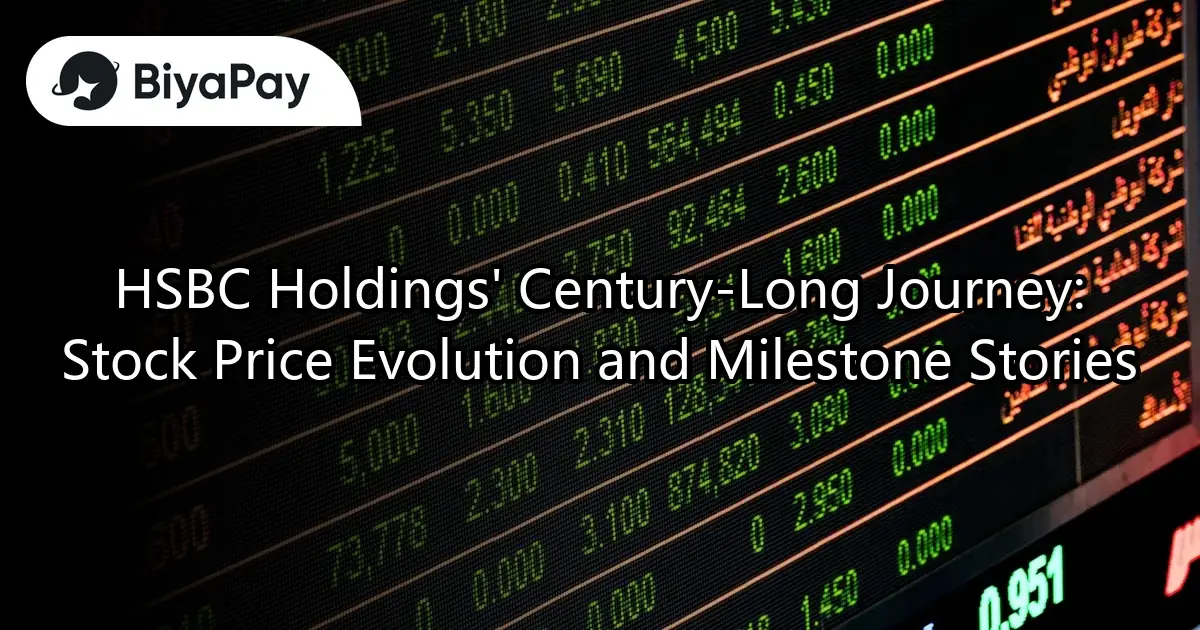- EasyCard
- Trade
- Help
- Announcement
- Academy
- SWIFT Code
- Iban Number
- Referral
- Customer Service
- Blog
- Creator
HSBC Holdings' Century-Long Journey: Stock Price Evolution and Milestone Stories

Image Source: pexels
Since its establishment in 1865, HSBC Holdings has undergone multiple significant transformations. Historically, HSBC Holdings has witnessed wars, economic crises, and global expansion. In each era, its stock price fluctuated with international events and company strategies. Today’s HSBC stock price reflects a century of accumulated experience and market confidence. Investors often focus on these ups and downs to seek insights into future development.
Key Points
- Since its founding in 1865, HSBC Holdings has experienced multiple stock price fluctuations, reflecting changes in the global economy and company strategies.
- The company has actively expanded into Asian markets, particularly China and Southeast Asia, driving steady stock price increases and boosting market confidence.
- Challenges such as financial crises and pandemics have prompted HSBC to strengthen risk management and digital transformation, enhancing competitiveness and brand image.
- Share buybacks and stable dividend policies have effectively increased shareholder returns, boosting investor confidence in HSBC.
- Investors should choose long-term holding or short-term trading strategies based on their risk tolerance, while monitoring global economic and company performance changes.
Stock Price Phases

Image Source: pexels
Founding Period
HSBC Holdings was established in Hong Kong in 1865. At that time, Hong Kong’s economy was just emerging, and the banking industry faced intense competition. HSBC Holdings became known for its prudent operations, gradually building credibility. Early stock price fluctuations were significant, mainly influenced by regional economic conditions and international trade. Although real-time stock price data in the modern sense was lacking, historical records show that HSBC Holdings steadily established itself in the Asian financial market, becoming a key player in Hong Kong’s banking industry.
Post-War Recovery
After World War II, Hong Kong’s economy recovered rapidly. HSBC Holdings’ stock price saw a significant rebound during this period. According to reports, the stock price once broke through a new high of 77.6 USD (based on the exchange rate at the time), signaling market confidence in its prospects. Financial stocks became a major force in driving index gains, with significant capital flowing into blue-chip stocks. After paying a fine for violating U.S. anti-money laundering laws, analysts believed the compensation issue was resolved, and future dividends were expected to increase. These factors reflected the company’s financial health and solidified its market position.
Post-Millennium
Entering the 2000s, HSBC Holdings actively expanded its international operations. Between 2006 and 2007, the stock price reached a historical high, exceeding 100 USD. During this period, global economic growth drove banking industry development. The 2008 financial crisis triggered a sharp decline in HSBC Holdings’ stock price, shaking investor confidence. Subsequently, the company underwent restructuring, gradually restoring profitability. This phase saw significant stock price volatility, reflecting the profound impact of the global economic environment on the banking industry.
Recent Trends
In 2019, HSBC Holdings’ stock price fell to a near-decade low, dropping to around 35 USD. The outbreak of the COVID-19 pandemic destabilized the global economy, posing challenges for the banking industry. From 2024 to 2025, HSBC Holdings actively pursued digital transformation and share buybacks, leading to a gradual stock price recovery, reaching a 52-week high. Investors focused on the company’s dividend policy and future growth potential. Overall, recent stock price trends reflect a gradual restoration of market confidence in HSBC Holdings’ long-term development.
Milestones and Stock Price

Image Source: unsplash
International Expansion
HSBC Holdings has consistently pursued business expansion in the global banking industry. Since acquiring Midland Bank in the 1980s, HSBC further solidified its international presence. In recent years, HSBC announced its exit from U.S. SME banking operations, focusing on Asia and core markets, particularly China and Southeast Asia. This strategic shift instilled market confidence in HSBC’s future development, with stable stock price performance.
- 45% of global institutions are optimisticリスボン bullish on Chinese stocks, citing policy stimulus and technological breakthroughs as key drivers of emerging market investments.
- 25% of surveyed institutions listed China as the fastest-growing emerging market for the coming year, reflecting strong economic growth expectations.
- 45% of surveyed institutions believe China’s strong performance is the biggest boost to emerging market development, up 16 percentage points from last year.
- 34% of investors are more optimistic about Chinese stock market prospects, up 15 percentage points from the previous survey.
HSBC’s focus on Asian markets, particularly China, has driven steady stock price increases. Market optimism stems from expectations of China’s economic stimulus policies and enhanced technological competitiveness. These factors have benefited HSBC during its international expansion, contributing to positive long-term stock price performance.
Financial Crisis
The 2008 global financial crisis had a significant impact on HSBC Holdings. At the time, many major global banks faced liquidity shortages, leading to sharp stock price declines. Although HSBC Holdings was less affected, it still required capital restructuring and risk management adjustments. During the Asian financial crisis, HSBC maintained sufficient capital through prudent operations, minimizing losses.
Post-crisis, HSBC strengthened risk controls and gradually restored profitability. Market confidence in its long-term development recovered, and the stock price rebounded with the economic recovery. This phase demonstrated that the banking industry must have the flexibility to respond to crises to maintain competitiveness.
Digital and ESG
Entering the 2020s, HSBC Holdings actively pursued digital transformation and ESG (Environmental, Social, and Governance) strategies. The company increased investments in digital banking services, enhancing customer experience. HSBC also committed to reducing carbon emissions, supporting sustainable development. These initiatives improved brand image, attracting young investors and international capital.
| Year | Key ESG/Digital Initiatives | Stock Price Impact |
|---|---|---|
| 2020 | Launched green financial products | Positive market response, stable stock price |
| 2021 | Strengthened digital banking services | Attracted new customers, slight stock price increase |
| 2022 | Announced carbon neutrality goals | Boosted investor confidence, sustained positive stock price trend |
Digital and ESG developments have become key drivers of HSBC Holdings’ recent stock price performance. The company’s ongoing innovation delivers long-term value to shareholders.
Share Buybacks
Share buybacks have become a key strategy for HSBC Holdings to enhance shareholder value. In October 2024, HSBC announced a buyback of up to 3 billion USD in shares, coupled with a stable dividend policy. Following the announcement, HSBC’s stock price rose 3.7% in the Hong Kong market, reaching a six-year high. The company’s third-quarter profit exceeded expectations, with a 10% increase in net profit and a 5% year-on-year revenue growth, reflecting growth in wealth management and wholesale banking businesses.
In June 2025, HSBC Holdings repurchased approximately 1.0892 million shares on the Hong Kong Stock Exchange at prices ranging from 11.9 to 12 USD (based on 1 USD to 7.8 HKD), costing around 13 million USD. Citi’s analysis suggests that HSBC’s first-quarter performance exceeded expectations, and the buyback program is expected to boost market confidence, driving stock price increases.
Share buybacks not only enhance earnings per share but also stabilize market expectations. Investors generally believe that HSBC’s continued share repurchasing and dividend payouts will deliver higher returns to shareholders, further solidifying its leadership in the global banking industry.
Today’s HSBC Stock Price
Recent Trends
From 2024 to 2025, today’s HSBC stock price has garnered significant market attention. HSBC Holdings’ stock price on the Hong Kong Stock Exchange reached a 52-week high in the fourth quarter of 2024, peaking at approximately 12 USD (based on 1 USD to 7.8 HKD). This high reflects investor confidence in HSBC Holdings’ financial health and future growth. The company announced a share buyback program in October 2024, with buyback prices ranging from 11.9 to 12 USD, further driving today’s HSBC stock price upward.
Analysts noted that HSBC Holdings’ third-quarter profit grew by 10%, with revenue increasing 5% year-on-year. These figures highlight strong performance in wealth management and wholesale banking businesses. The market generally believes that stable dividend policies and ongoing share buybacks will help maintain today’s HSBC stock price stability. Investors closely monitor the company’s future earnings announcements and global economic environment changes, as these factors directly impact today’s HSBC stock price fluctuations.
Experts suggest that investors should focus on HSBC Holdings’ developments in Asian markets, particularly China and Southeast Asia. Economic growth in these regions is expected to provide further upward momentum for today’s HSBC stock price.
Investment Insights
Today’s HSBC stock price fluctuations offer multiple insights for investors. Long-term investors can benefit from HSBC Holdings’ stable dividends and share buyback policies. These measures help enhance earnings per share and provide stable returns for shareholders. Short-term investors can capitalize on today’s HSBC stock price volatility for trading opportunities, seizing short-term market movements.
Below are strategies investors can consider:
- Long-Term Strategy: Hold HSBC Holdings shares to enjoy stable dividends and capital appreciation.
- Short-Term Strategy: Monitor today’s HSBC stock price technical trends to capitalize on price fluctuations for short-term trading.
- Risk Management: Closely track global economic changes and company performance, adjusting portfolios dynamically.
| Strategy Type | Key Features | Suitable For |
|---|---|---|
| Long-Term Holding | Stable dividends, capital appreciation | Investors with higher risk tolerance |
| Short-Term Trading | Capitalizing on price fluctuation opportunities | Those who prefer flexible operations |
| Risk Management | Diversified investments, dynamic adjustments | Those seeking stable returns |
Investors should choose strategies based on their risk tolerance and investment goals. Although today’s HSBC stock price is influenced by various factors, the company’s long-term development direction is clear, with significant potential in Asian markets. Education experts suggest that young investors can learn from HSBC Holdings’ historical and current performance to develop a long-term investment perspective.
HSBC Holdings has experienced significant stock price changes across various eras, driven by milestones such as international expansion, financial crises, and digital transformation. These historical experiences remind investors to pay attention to company strategies and market environments. From HSBC Holdings’ development, investors can learn how to diversify risks and seize long-term opportunities.
FAQ
Why does HSBC Holdings’ stock price fluctuate significantly?
HSBC Holdings’ stock price is influenced by global economic conditions, policy changes, and company strategies. Market confidence and international events can lead to significant price fluctuations.
What are the characteristics of HSBC Holdings’ dividend policy?
HSBC Holdings has maintained a stable dividend policy over the long term. The company adjusts dividends based on profitability and capital needs, attracting long-term investors.
How do HSBC Holdings’ share buybacks impact investors?
Share buybacks enhance earnings per share and increase shareholder returns. In 2024, the buyback price ranged from 11.9 to 12 USD (1 USD to 7.8 HKD).
What are the risks of investing in HSBC Holdings?
Investors should be aware of global economic fluctuations, regulatory policies, and exchange rate changes. These factors impact company performance and stock price.
What are HSBC Holdings’ future development priorities?
| Priority Direction | Description |
|---|---|
| Asian Markets | Focus on growth in China and Southeast Asia |
| Digital Transformation | Promote online banking and ESG strategies |
HSBC Holdings’ share price volatility and high cross-border investment barriers, coupled with complex tracking of digital transformation and ESG initiatives, limit efficiency, while restricted flexible savings independently curb fund utilization. BiyaPay, an all-in-one financial platform, simplifies processes for instant US and HK stock investments, empowering you to seize global market opportunities. Remittance fees are as low as 0.5%, covering 190+ countries with same-day transfers. Its flexible savings offer a 5.48% annualized return, with daily interest credited automatically and anytime withdrawals, supporting 30+ fiat and 200+ cryptocurrencies, secured by KYC.
Explore BiyaPay today to launch your global wealth journey! Join BiyaPay for streamlined fund management!
*This article is provided for general information purposes and does not constitute legal, tax or other professional advice from BiyaPay or its subsidiaries and its affiliates, and it is not intended as a substitute for obtaining advice from a financial advisor or any other professional.
We make no representations, warranties or warranties, express or implied, as to the accuracy, completeness or timeliness of the contents of this publication.




Contact Us
Company and Team
BiyaPay Products
Customer Services
is a broker-dealer registered with the U.S. Securities and Exchange Commission (SEC) (No.: 802-127417), member of the Financial Industry Regulatory Authority (FINRA) (CRD: 325027), member of the Securities Investor Protection Corporation (SIPC), and regulated by FINRA and SEC.
registered with the US Financial Crimes Enforcement Network (FinCEN), as a Money Services Business (MSB), registration number: 31000218637349, and regulated by FinCEN.
registered as Financial Service Provider (FSP number: FSP1007221) in New Zealand, and is a member of the Financial Dispute Resolution Scheme, a New Zealand independent dispute resolution service provider.



















